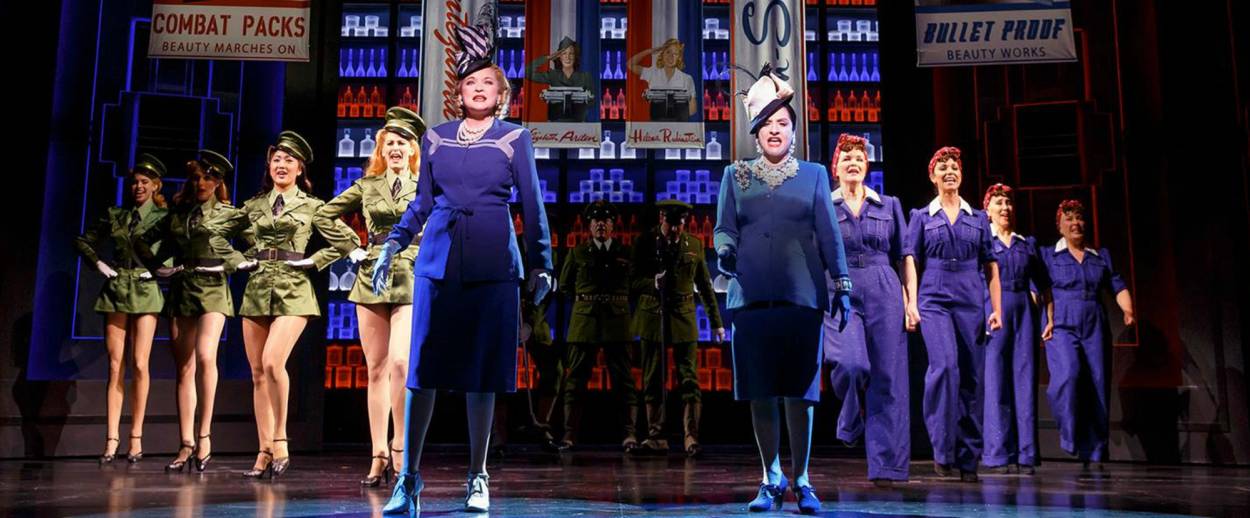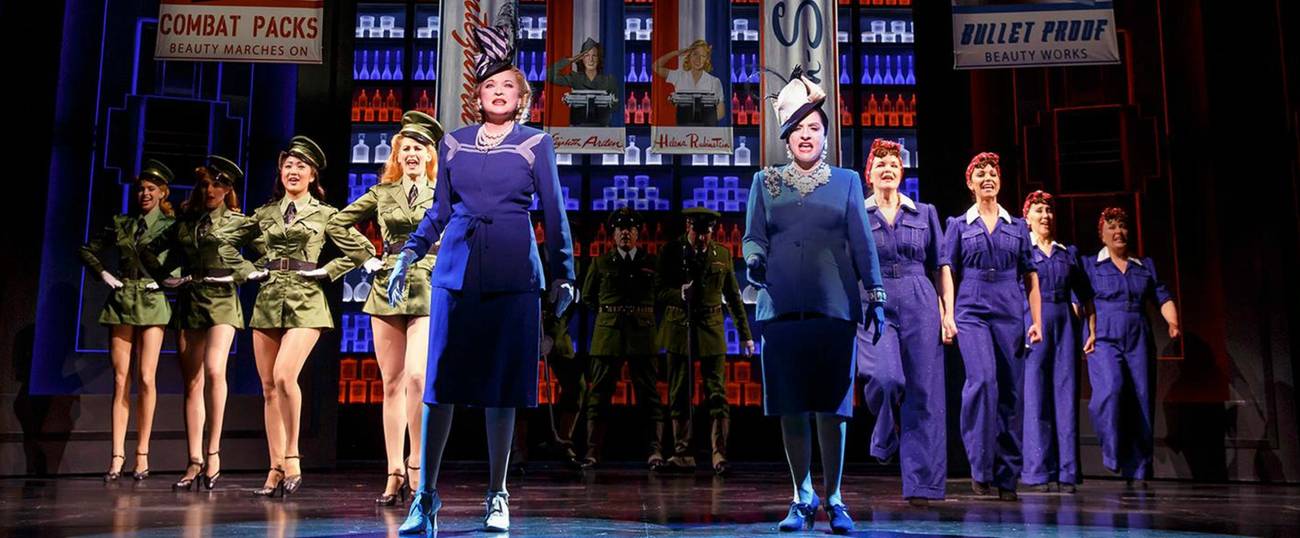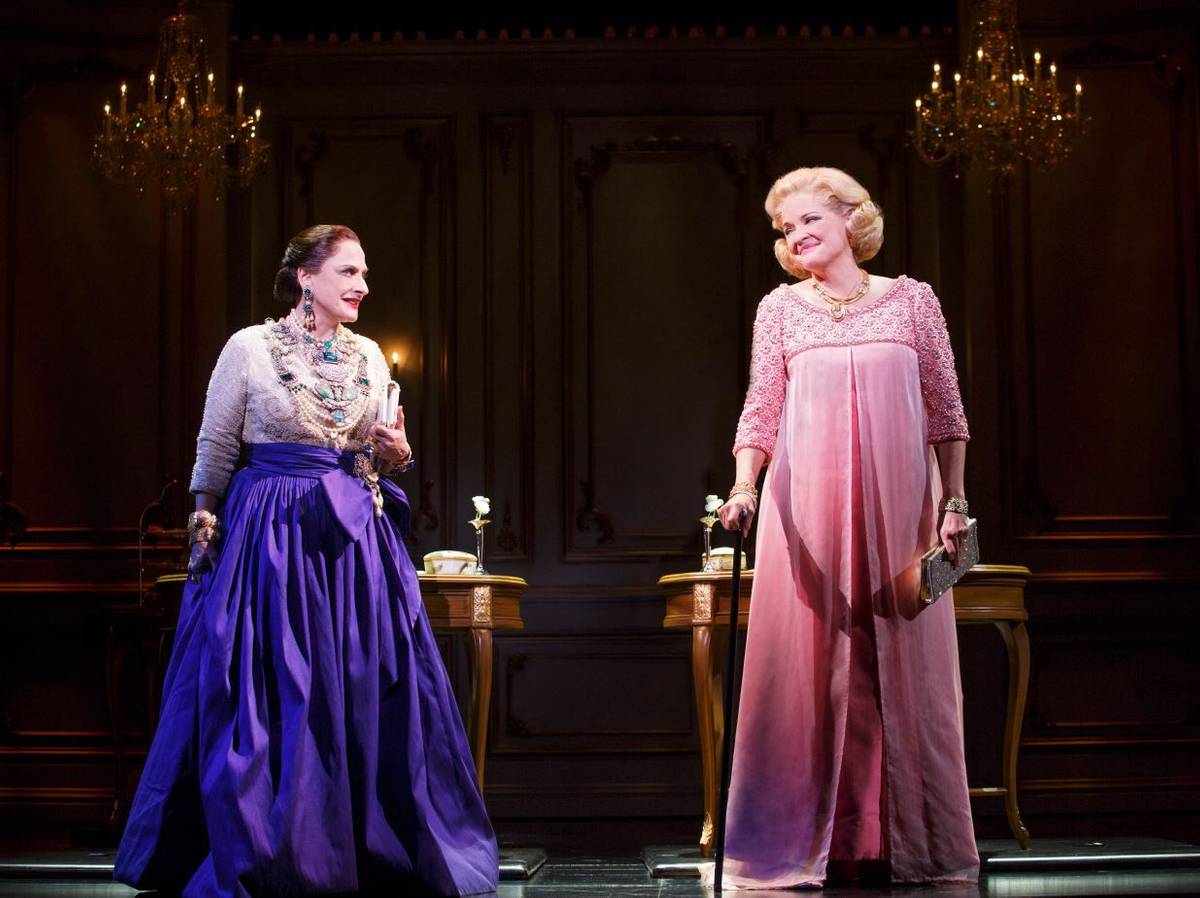Skin Deep
In Broadway’s ‘War Paint,’ a new musical about rival cosmetics moguls, Christine Ebersole and Patti LuPone shine, as do the costumes, but its greatness ends there




In a Broadway season that puts both Sholem Asch and Shimon Peres onstage as characters, the most powerful, fierce Jewish figure of them all may be neither the writer nor the Israeli politician. Instead, it’s Helena Rubinstein, the manufacturer and seller of cosmetics, whose rivalry with fellow makeup empress Elizabeth Arden is the subject of the new musical War Paint.
The musical follows entrepreneurs Arden and Rubinstein, played respectively by theater greats Christine Ebersole and Patti LuPone, from 1935 to 1964 and through both career and personal ups and downs, with their enduring enmity for one another a constant thread. Based on a book and documentary both called The Powder & the Glory, there are elements of the story that make for great, stranger-than-fiction drama. For example, they had a tendency to hire ex-employees of the other, including Rubinstein finding a place in her staff for Arden’s ex-husband.
But not all truths are so tidy, and War Paint has deep structural issues, some of which stem from challenges in the story—the most obvious of which is that Arden and Rubinstein never actually met in real life, which, for some reason, also occurs onstage as well (mostly). The result is two hours of teasing (in the end we get but ONE interaction) and in the meantime there is a lot of careful blocking where the two women cross paths without making eye contact, and duets where characters don’t realize they’re singing with one another—usually either about hating each other or secretly going through parallel struggles. While the performances of both Ebersole and LuPone are a tour de force, it’s exhausting to watch these two amazing women waste their energy on undoing the other. They’re so focused on their arch-rivals that they hardly notice other, while male competitors like Charles Revson (as in Revlon), sneak up behind them. Arden thinks that Rubinstein’s clientele should be a bit more “Second Avenue” (if you take her meaning). Rubinstein jokes that Arden castrated the latter’s ex-husband.

The core creative team of War Paint is identical to that of 2006’s Grey Gardens—music by Scott Frankel, lyrics by Michael Korie, book by Doug Wright, and directed by Michael Greif. It all begs the issue: Frankel, Korie, and Wright are all talented theater creatives who have created great pieces of art, but… how different would the show have been in the hands of women? The source book and film are both more female-created—could the musical have been as well? (In the entire creative team, from the libretto to the set, the only female designers are for costumes (Catherine Zuber) and makeup (Angelina Avallone).)
Historically, yes, the women really were bitter rivals. But considering the lip(stick) service that the show’s text gives to the accomplishments of these women, their enmity towards one another always seems to surpass exploration of their achievements. Yes, they were complicated, flawed people, but do we really need to spend this much time on the men they dominated to help run their empires?
And the women are what make this show work, when it does. The costumes are nothing short of breathtaking—easily establishing a wide range of eras, and giving clear, exquisite looks for the camps of both women. Arden is often in her signature pink, very uptown, impeccably tailored. Rubinstein is dripping in fabric and jewels. Honest to HaShem, she wears a heavily sequined, white nightgown with sleeves you could fit another Patti LuPone into. Patti could be singing the alphabet at that point.
What else is there to say about LuPone and Ebersole, except that it’s a blessing to watch them share a stage? It’s still a mystery that the stage manages to fit the both of them at once. In roles written for them, Patti belts, Christine hits the high notes, the audience has a spiritual experience. This Broadway season is incredibly blessed to have both them and Bette Midler star in musicals.
In terms of score—the comparison to Midler in Jerry Herman’s Hello, Dolly falls flat. Songs by Frankel and Korie are seldom numbers you leave a theater humming; they require you to slather the songs on like Rubinstein’s day and night face creams and give them time to see if they work. But on the whole, this score is not their finest collaboration.
One area where the show far better succeeds is that of Helena Rubinstein’s identity; War Paint is unafraid of exploring her Jewishness (the creative team is far more Jewish than it is female). When they could make her generically European (The New York Times‘ review of the show’s Chicago tryouts had the chutzpah to describe Rubinstein as Polish) the show (and Rubinstein herself) constantly remind us that she had to fight anti-Semitism to build her empire, and that prejudice still at times stands in her way. LuPone (not Jewish, but boy can she play it) constantly bemoans her shtetl childhood and drops Yiddish words in ways that seldom feel forced. Are there issues with the idea of the Jewish woman as pushy, loud, garish, undersexed? Perhaps, but LuPone’s performance is so masterful that such problems seem minimal. Hearing her dismissively declare, “Goyim!” was so satisfying that the show should sell it as an mp3.
But if only the show handled its issues of women and beauty with the same thoughtfulness. Despite one of its promotional taglines, it never really goes more than “skin deep.” Only in the very end of the show (really its highlight) Rubinstein and Arden stop and consider if they’ve actually empowered women with their beauty products, or pressured them to fit a mold. There was little indication of this issue for the prior two hours of the evening, and it’s too little, too late.
But if you can quiet the third-wave feminist part of your brain, the show does make making makeup seem rather exciting. Ultimately, would you like to see a fashion show that covers chic women over four decades? Would you like it if the two main models were Patti LuPone and Christine Ebersole? Would you like them to sing while they do so? If you answered yes, the rest hardly matters. Oslo isn’t half as fabulous.
War Paint is currently playing at the Nederlander Theatre at 208 W. 41st Street.
Previous: The First Female Jewish Skincare Mogul
Gabriela Geselowitz is a writer and the former editor of Jewcy.com.